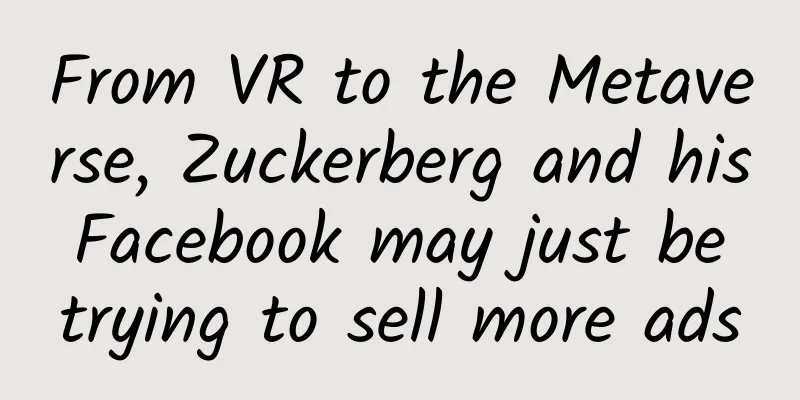From VR to the Metaverse, Zuckerberg and his Facebook may just be trying to sell more ads

|
Social media giant Facebook seems to be really going all in on the metaverse. On September 23, Facebook announced that Andrew Bosworth, the executive currently in charge of VR (virtual reality) and other consumer electronics products, will serve as the company's chief technology officer (CTO). This personnel appointment still failed to avoid the keyword that has been popular for a long time: Metaverse. Facebook CEO Zuckerberg said that this move will promote Facebook's work on creating the Metaverse. Ever since Zuckerberg boasted in July this year that Facebook will become a metaverse company within five years, he has entered the "missionary" state of talking about the metaverse every other sentence. In front of the media and at financial reports meetings, Zuckerberg never hides his wonderful vision for the future of the metaverse. In the words of this well-known entrepreneur, the Metaverse is the ultimate solution to the fate of all mankind. It not only allows people in different parts of the world to feel that they are close to each other, but also allows the human cerebral cortex to do whatever it wants. Naturally, under his leadership and promotion, Facebook began its rapid march into the field of the Metaverse. Just a few days after Zuckerberg made his company transformation speech, Facebook announced the establishment of a metaverse product team within the VR division. At a subsequent investor conference, he announced that he would invest billions of dollars in Facebook Reality Labs (FRL) to promote the construction of the metaverse. In August this year, Zuckerberg demonstrated a new VR App: Horizon Workrooms. Don't be fooled by its name, in short, this is a VR version of an online conference room. In Zuckerberg's vision, this product can completely replace video tools such as Zoom, so that online meetings will no longer be fragmented images, but more like a real meeting room. But I have to say that this tool looks really... very... very rough. First, the legless, expressionless stand-ins don't look like they're suitable for serious business situations. In addition, this tool is completely dependent on VR. This means that if a company wants to promote Metaverse meetings on a large scale, it will need to purchase a $300 Oculus headset for each employee, teach them how to use it, and try to keep the meeting time within 20 to 30 minutes, otherwise dizziness or even vomiting will be inevitable. As you can see, Facebook's so-called "metaverse" is actually extremely dependent on VR technology and equipment, and has no intention of starting from scratch to create a new world. Or to be more harsh, as Cook said, at Apple, we don't say the word metaverse, we think of it as AR (augmented reality). What is even more embarrassing for Zuckerberg is that the not-so-long memories between Facebook and VR have already been scarred and are far from sweet. In 2014, Facebook spent $2 billion to acquire VR startup Oculus. Zuckerberg was as excited as he is now: "It can give you an immersive digital experience and make you feel like you are in another place with different people." Does this sound familiar? Two years later, Zuckerberg said that VR can render "another reality" and Facebook will invest a lot of money in it. Seven years have passed in the blink of an eye. Has Facebook’s VR dream come true? Obviously, no. Facebook's latest VR headset, Oculus Quest 2, has only sold 4 million units in the United States, where consumer power is strong. In terms of results, it has not only failed to drive the development of the entire VR industry, but its sales volume is even lower than that of the more stable Valve Index. Why did Facebook's VR fail to achieve the expected results? In addition to the various limitations of VR itself, Facebook's own technical defects have become an underlying problem that cannot be ignored. For cutting-edge products such as VR and even the Metaverse, the two most critical elements are semiconductor chips and software architecture. But from the current point of view, Facebook seems to be difficult to be competitive in both aspects. In terms of hardware, Facebook's VR devices all use Qualcomm From this perspective alone, Facebook, which regards itself as the promoter and spokesperson of the VR industry, actually does not have much core competitiveness. The arrival of Apple is simply a dimensionality reduction attack on them. In terms of software, if you want to create a metaverse that will continue to enrich the world in the future, the most needed are programming engines and digital object creation tools. In this field, Epic, which owns the Unreal Engine, can already hold concerts in a battle royale game with 100 people competing on the same field. Hardware giant Nvidia has also released a software platform for creating virtual digital worlds based on its accumulated technology in the graphics field. Compared with such a rival, Facebook is not completely broke, but it is also destitute. And this gap cannot be made up in a short period of time simply by investing billions of dollars and talking nonsense from Zuckerberg. Despite so many unfavorable factors, Facebook and Zuckerberg are still pushing the Metaverse. It is not difficult to understand what they are thinking: to prolong the life of the company's main business and extend its life cycle. In August this year, the Nihon Keizai Shimbun released the 2020 global app download rankings, and TikTok surpassed Facebook for the first time to become the first. In June this year, Facebook had 2.895 billion monthly active users, up 7.4% from the same period last year, but the growth rate slowed down by 4.6%. At the same time, according to statistics from foreign institutions, since 2017, the largest proportion of Facebook users lost have been those aged 12 to 34, which means that young people around the world are fleeing Facebook at an accelerated pace. Young people are losing their sense of novelty about social media, but they will always remain enthusiastic about new, unformed, futuristic products, such as the concept of the metaverse. This also explains why Facebook is always unusually enthusiastic about conceptual products that will obviously not produce any results in a short period of time - only in this way can the enthusiasm threshold of young people be adjusted to the highest point and the timeline be stretched to the longest. To take a step back, even if Facebook really launches a mature and popular metaverse product, the source of its revenue is still a question mark. What kind of profitable business model does it plan to add to it? If Facebook has any core technology, it is nothing more than its recommendation algorithm. What is the means by which Facebook monetizes this algorithm? It is still advertising. In the current revenue structure of Facebook, advertising revenue accounts for 98%, so it can be said that they are completely an "advertising company". Why did Zuckerberg react so violently when Apple launched a new privacy policy this year? Because it affects the foundation of himself and Facebook. If they cannot obtain user privacy smoothly, how can the recommendation algorithm be accurate? Facebook's advertising is not pretty at all. When Oculus was first acquired by Facebook, its co-founder promised that Oculus users would not need to bind their Facebook accounts or be overwhelmed by built-in ads. But Facebook apparently has no intention of complying with any of these agreements. Last October, they even asked New York University to shut down its ad targeting research project. In August this year, they also banned the account of the project's research institute on the grounds of privacy. In general, even in the metaverse, Facebook will still rely heavily on its advertising push system and will likely innovate in advertising. However, the current Internet environment may not allow them to continue to "innovate" in this way. Nowadays, regulatory agencies at home and abroad are strengthening their supervision of advertising methods such as big data push. In the long run, advertisers' willingness to place ads will inevitably decrease due to lack of "precision", and Facebook will undoubtedly be the biggest bearer of this privacy regulation trend. There is no doubt that Facebook is an advertising company. It doesn't matter whether it exists or not. Competitors can replace it seamlessly in a second. Because Facebook does not actually provide any products. It is just an Internet big data platform that pushes advertisements to users. Targeted advertising based on user data has made Facebook and Zuckerberg wealthy, but this huge dividend of the times is increasingly becoming a torrent that can consume it all. The transition from social media to the metaverse, this evolution from 2D to 3D may give Facebook an opportunity to reshape its business model, but it may also lead to their complete demise - if the concept of the metaverse also collapses halfway, and Zuckerberg pushes a certain concept in the future, will the whole world once again be intimidated by his wealth and follow suit? Where will Facebook go in the future? It is impossible to predict, but we can look for an answer from the past. In 2006, Jeff Hammerbacher, a math genius who graduated from Harvard University and was known as the God of Data, joined Facebook, which was still a startup at the time. His position was "research scientist" - studying how people use social networks. But a few years later, Jeff waved goodbye and left behind a famous quote that has been passed down to this day: “It’s too bad that the brightest minds of our generation are trying to figure out how to get people to click on ads.” As a winner of Toutiao's Qingyun Plan and Baijiahao's Bai+ Plan, the 2019 Baidu Digital Author of the Year, the Baijiahao's Most Popular Author in the Technology Field, the 2019 Sogou Technology and Culture Author, and the 2021 Baijiahao Quarterly Influential Creator, he has won many awards, including the 2013 Sohu Best Industry Media Person, the 2015 China New Media Entrepreneurship Competition Beijing Third Place, the 2015 Guangmang Experience Award, the 2015 China New Media Entrepreneurship Competition Finals Third Place, and the 2018 Baidu Dynamic Annual Powerful Celebrity. |
>>: Beats Music app enters the list of "Apple-developed apps"
Recommend
How can products get more users to pay? Share 3 tips!
When a product enters the mature stage and has en...
This "black hole observer" gazes into the darkness in the starry sky
There are many evidences to prove that we and the...
10 Marketing Rules of Queen Estee Lauder
What I want to talk about today is not Estee Laud...
Alipay earns money red envelopes, how to use Alipay earns money red envelopes?
Alipay has started to make money by sharing red e...
Super Sales Private Camp helps you break through performance resistance
Super Sales Private Camp helps you break through ...
Beware! The cold and dry winter climate can easily induce four types of eye diseases. It is important to know how to prevent them correctly!
It is winter, the climate is cold and dry, and th...
Why do ants have such clear division of labor? It turns out that their brain circuits are different
In the evolution of animals, a major turning poin...
The online sale of atropine, the "miracle drug for myopia", has been suspended! Can children still use it? Experts remind us:
Recently, Shenyang Xingqi Eye Hospital announced ...
B-side operation strategy and growth model!
B-end operation is an unfamiliar field for many p...
Alipay, NetEase and others’ “year-end review” H5 operation routines
As the year draws to a close and the new year beg...
2018 Tik Tok complete analysis report!
I haven't written anything seriously for a lo...
Programmer's own ability expansion model
[[142043]] I heard someone say a word called “Com...
There are "mama's boys" and "community bulls", killer whales may not be as simple as you think!
Among the whales and dolphins Killer whales are u...
Apple and Google team up to track the spread of the epidemic using iPhone and Android apps
Apple and Google announced a partnership on Frida...
Led by Chinese scientists, Einstein's predictions were confirmed!
The black hole that humans "saw" for th...









